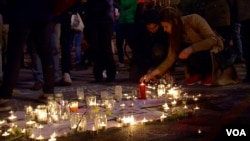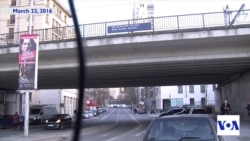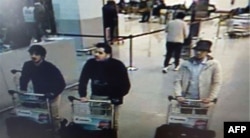As police sirens sounded across Brussels on Tuesday evening, hundreds gathered in front of the city’s stock exchange, lighting candles and scrawling messages of solidarity and defiance against the terrorists who killed more than 30 people and injured more than 200 just hours earlier.
For college graduate Elise Balis, who wandered to the Place de la Bourse with her boyfriend, the evening rally offered a dose of much-needed cheer.
"I was alone in my house all day and I felt bad" after the attacks, she said. "We all share the same feeling, sadness. It feels good to be all together."
Nearby, a group of people hoisted a banner carrying the proud message "I am a Brussels resident" in French and Flemish. Others linked arms and sang songs. Posted amid the stock exchange's marble pillar was another sign: "United against hatred."
The scenes offered an eerie throwback to the terrorist attacks in Paris a few months ago that drew tens of thousands to the streets. But now, it is neighboring Brussels — often described as the heart of Europe — that has been targeted.
WATCH: Brussels quiet, on edge after attacks
The Islamic State group has claimed responsibility for the morning suicide bombings at Zaventem airport outside Brussels and Maalbeek metro station, in the city's center, where many European Union institutions are based.
The first explosions occurred shortly before 8 a.m. at the Brussels airport, while the second took place about an hour later at Maalbeek, at the height of rush hour.
A widely published surveillance photo taken at the Brussels airport shows what Belgian authorities believe to be two of the suicide bombers pushing luggage carts, each wearing one dark glove. Police are searching for the third man in the photo, who is wearing a hat.
Authorities also have found an “explosive device” during a search in Brussels’ Schaerbeek district, along with chemical products and an Islamic State flag, Belgium’s federal prosecutor’s office said in a statement.
Muslims brace for reprisals
For Limou Danbi, who joined the crowd at the stock exchange, the news of yet another Islamist attacker was a blow.
"As a Muslim, I don't recognize my religion in these attacks," said Danbi, who sports a headscarf.
Already, she was braced for reprisals. "Even before the attacks, we felt there was a fear of the Islam we represent. So things won't get better after the attacks," she said.
The morning bombings have left the city in fear. Although some residents gathered at bars and restaurants, many of the streets were eerily quiet. Soldiers and police were out in force, and while commuter trains were back in service by the afternoon, airports and the main Gare du Midi international train station were shuttered.
Police were stationed at the French-Belgian border, where traffic passed smoothly into Belgium but long lines of cars were backed up waiting to cross into France.
Police also taped off roads around the Maalbeek metro station in Brussels, leaving commuters seeking alternative routes home.
Anxious residents mourn victims
Businessman Thierry Cornet, who left the station shortly before the bombing, is still trying to come to grips with the new reality.
"It's quite a strange sensation," he said. "We usually feel so safe. It's hard to realize that it can happen here."
Nearby, Polish construction worker Kamil Algazali said he mostly felt sadness for the victims and their families.
"I'm not sure what it's all about, but I feel bad things are going on right now," he said. "I have a bad feeling about the future."
The attacks came just days after Brussels police arrested Salah Abdeslam, a top suspect in the November 13 attacks in Paris. Experts believe the Paris attacks were at least partially prepared in Belgium, and many assailants were Belgian nationals — or residents like Abdeslam.
But Brussels commuter Cornet, for one, dismissed the idea that the attacks were in reprisal for Abdeslam's arrest.
"You don't just improvise, you need time to prepare something," he said. "And these attacks were very well prepared."








